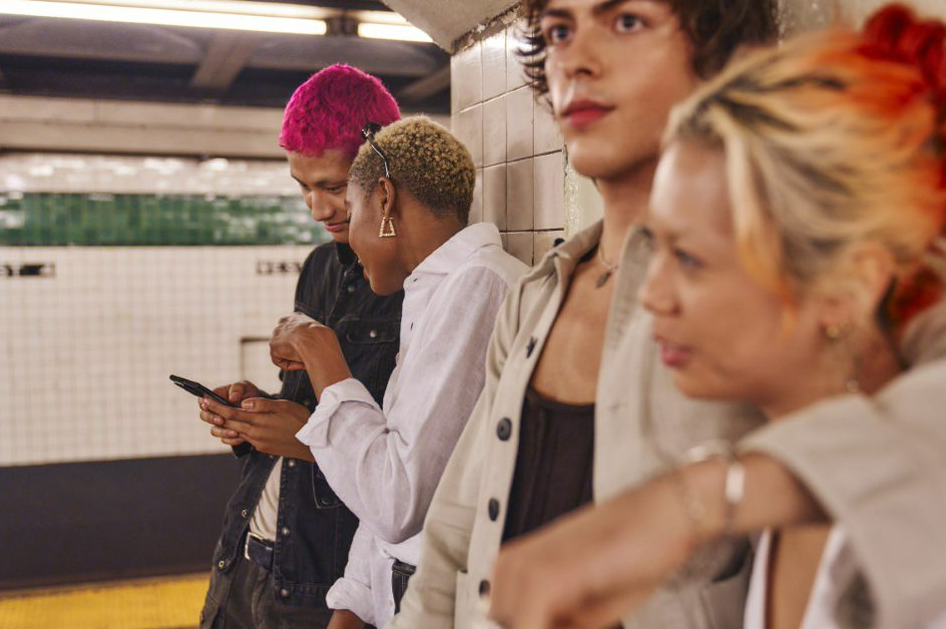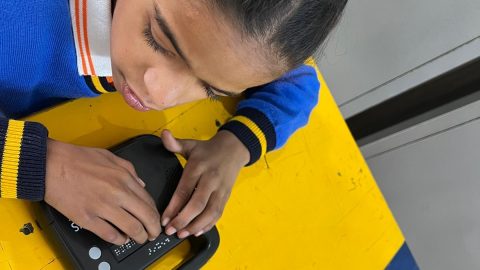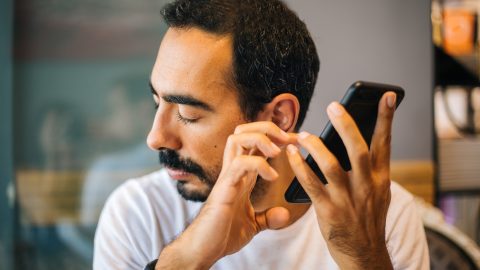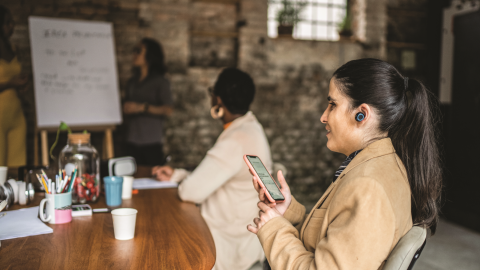Mental health support made accessible using AI-powered chat
When asked what barriers keep someone from finding adequate mental health resources, Theresa Nguyen, chief program officer at Mental Health America, replied, “What isn’t a barrier?” For someone who is struggling with mental health, these barriers could range from shame, access, all the way to affordability of solutions.
Before she was an advocate for accessible mental health resources, Nguyen was someone who needed those resources for herself. She struggled with depression at a young age, but she couldn’t find resources to help her know what was “normal”. Without answers, she said she felt ashamed and thought it was easier to hide her problems than talk to someone about them.
As the daughter of two working Vietnamese immigrant parents, she didn’t want to burden her family with her mental health struggles. She confided in a close friend and eventually the National Suicide Prevention Line but struggled to find treatment or a solution.
Enter Mental Health America
In 2005, Theresa started her career as a rehab specialist with Mental Health America in Orange County, California. Now, Nguyen has more than 15 years of experience in mental health and works at Mental Health America (MHA), a community-based nonprofit serving those with mental illness and promoting overall mental health. MHA’s work is driven by its commitment to promote mental health as a critical part of overall wellness.
“I loved the fighting spirit of the organization,” Nguyen said. ““The people that I spoke to in the MHA network talked about the importance of self-determination, that my voice is the most important voice in this journey.”
At MHA, Theresa started the online screening program, where website visitors could take a mental health test to gather information on a potential mental health condition and find resources for next steps to take. The screening program went from providing a couple thousand tests per week to providing 1.5 million screenings in 2020 and 5 million screenings in 2021.
The texting platform
Her newest project is an adaptive AI-powered texting platform for mental health intervention with Northwestern University and the University of Toronto. Of the 89 percent of people who screened positive for major depression through MHA’s online survey last year, 79 percent did not want to pursue psychotherapy or medication. It’s these alarming statistics that guide the team behind the AI-powered texting program. The program seeks to provide personalized support with few barriers to entry, so that anyone can get help at their comfort level.
In today’s world, even if someone did want to seek help, they can often be held back due to costs and access to treatment. The locations of mental health professionals can be limited and not everyone has the technological capability to look for help. With the texting platform, users don’t have to jump into immediately interacting with another person and can explore different ways to tackle their mental health conditions without worrying about cost or how to find help.
“It’s immediate, you just type some things. If you hate it, you can leave it. If you like it, you stay engaged and it’s low cost. You don’t have to navigate the system of care or insurance to get immediate support,” explains Nyugen.

Assistance from machine learning
With current research showing that most users do not use mental health apps beyond two weeks, the texting platform offers a more promising alternative. The platform works by offering pushed text messages throughout the day, giving the user the opportunity to engage whenever they’re ready. Because it uses SMS, there’s no need for data or internet access to interact with the AI bot. After signing up on the MHA website, a text conversation is initiated and the user answers questions. From there, the platform uses machine learning to drive specific engagement interests and learn more about the activities of the user, like the topics they’re interested in and the best format for information. Users can also provide optional information on their demographics, experiences, and interests to help tailor the bot. The ebbs and flows of mental illness can be wildly unpredictable. Planning care schedules around these intense fluctuations is something Nguyen hopes to solve with the platform.
“I might not open an app or I’m not going to call my friend, but if I’m lying in bed in the middle of the night, and I’ve told this platform, ‘Hey, I really like getting texts at 10 PM.’ And it sends me texts at a time when I know that I’ll probably need it. That’s the kind of experience that I can plan for when I’m well, but when I’m not well, it’ll just come because I need it.”
Theresa hopes the bot can reduce feelings of judgment and guilt that often come with the decision to seek help, feelings that she feared as a child. She adds that the advent of digital technology is especially important for providing resources to young people and teens who may have to deal with additional questions on what should feel normal.
Building a successful community
The duration of untreated illness and psychosis sometimes last years. Nguyen hopes the platform can fill the gap between realizing that care is needed and actually seeking care.
“The impact that this texting program could have on the population at large is incalculable,” says an anonymous user of the program. “I know I would benefit from it and I am sure that thousands of others would, too. A lot of young adults and teenagers suffer from mental health issues because, well, frankly, the world sucks, and anything that is well-researched and proven to be beneficial, things such as this texting program will definitely impact my peers for the better.”
The decision to get care can be overwhelming. Finding a provider that you relate with can be difficult.
“It’s hard to find a provider period, right? Let alone someone you trust,” Theresa said.
When signing up for the texting platform, users will be able to agree to a privacy policy and all identifiable information is encrypted to prevent tampering. No identifiable information will be saved so users can trust that their privacy is protected. For those seeking help, it may be their first time sharing personal information about trauma. For others, it could be their first time speaking about navigating a mental illness. The platform intends to provide users with knowledge and skills before their first visit, so they can move forward to more help when they feel comfortable. Theresa calls it setting users up for success.
The texting platform’s constant presence is reassuring, especially at a time when healthcare providers are facing burn out due to increasing demands for their service. “What’s nice about the asynchronous bot is it’s not going to be burnt out,” Nguyen said. The team is experimenting with crowdsourcing user-generated advice and words of affirmation to provide a community aspect to the platform.
Interviewees who have tested the platform indicated that the tool helped them to feel validated, experiment with new skills and activities for their mental health, and find commonalities with others. An anonymous user added their thoughts on building a community, “There are so many different people with so many different values and ideas on what solutions we could come up with. And I really enjoyed that, seeing that there were so many people. We’re all different, but at the same time, we’re all facing similar issues. It really helps.”
Next steps
Microsoft offered the initial financial and technical support to start the project through a grant with the AI for Accessibility program. The next stage of research is to deploy the platform to a group of 10,000 users. The team’s ultimate goal is to offer the texting platform to the millions of annual users that visit the MHA screening website.
Nguyen has come a long way from the child who quietly struggled with her mental health. As an adult, she recognizes the diagnosed and undiagnosed mental illness in her family that was simply not discussed. Her journey with mental health continues, but she feels better prepared to receive care and grateful for accessible technology that allows her to ask questions and learn more about herself. She wants people today to easily seek help at their own pace, and believes the platform will give users the knowledge, skills and confidence to advocate for themselves and their voice as the patient.
“I think what’s cool is that we’re giving power back to people and allow them to seek help at a level they are comfortable with,” explains Nguyen.
Learn more about related resources:
- Explore Microsoft AI for Accessibility projects
- Find more stories about the people behind AI projects making a difference at Humans and AI
- Learn more about Mental Health America
- Learn about self-help tools at Mental Health America
- Learn about conversational AI tools from Azure
- For anyone struggling with urgent mental health crises, the National Suicide Prevention Lifeline is available 24/7 at 1-800-273-8255








